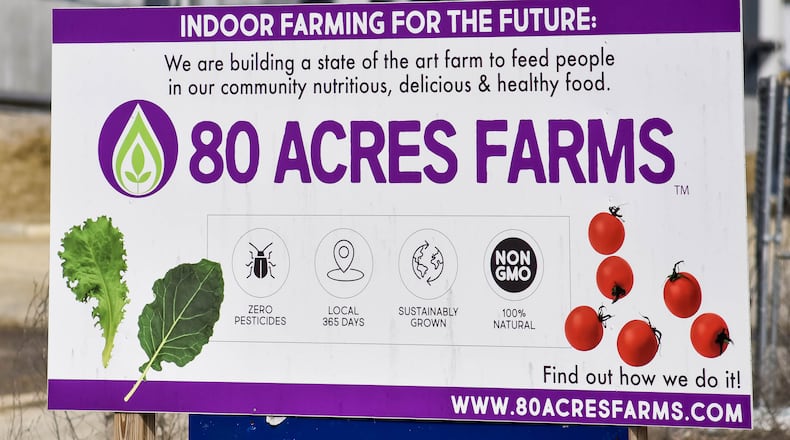Facilities include 80 Acres Farm in a former industrial building in downtown Hamilton, a BrightFarms greenhouse across from the Wilmington Air Park in Clinton County and Davidson Family Growers, a century-old New Carlisle family farm also growing with hydroponics. TAC Industries, a Clark County agency for the mentally and physically disabled, operates TAC Farms and grows hydroponic lettuce for area restaurants.
The facilities were begun as some consumers and investors saw hydroponic farming as more sustainable - food grown locally requires much less transportation.
Hydroponic crops are grown in liquids that carry mineral nutrients, and often are grown without pesticides. The systems are not necessarily organic - that depends on the nutrients used - and that the facilities can be costly to build and operate. The vast majority of produce in the U.S. is still grown using soil.
Still the global indoor farming technology market accounted for nearly $6.5 billion in 2017 and is projected to reach nearly $15.3 billion by 2024, according to a 2018 Zion Market Research report.
Supporters of hydroponic produce say the main benefit is the reduced transportation costs. Produce can be delivered locally overnight,
and hydroponic fruits and vegetables raised regionally allow producers, stores and customers to "try to build a local relationship,” Fernando said.
Miami Valley sustainable, indoor-farming endeavors
In Clark County, Davidson Family Growers in New Carlisle is doing traditional farming as well as hydroponic farming.
For the Davidsons, traditional farming began in 1886. Kevin Davidson got into hydroponics in 2015.
In March, when COVID-19 first struck, business was devastated. “That was a big problem. I lost 90% of my business in three days,” Davidson said in a phone interview last week.
Restaurants and customers, including UD, shut down on the same weekend, he said.
Davidson, who has an engineering degree from UD, said hydroponic demand has picked back up since he began concentrating on selling through on-line farmers markets.
He said revenue is back to where it was in the spring, although more labor is required to ready his produce to be dropped off at distribution hubs in Columbus and Cincinnati, where it is redistributed to buyers' doorsteps.
Davidson sells lettuce, kale and cabbage products raised through hydroponics.
In Hamilton, 80 Acres Farms operates two locations, including one in a formerly dilapidated historic building at 319 South 2nd Street in the city’s downtown.
The business also operates from a Cincinnati location. At an automated facility on Enterprise Drive in Hamilton, leafy vegetables, herbs and strawberries are raised. The former Miami Motor Car Co. building in downtown Hamilton is used to raise vine crops, including tomatoes, cucumbers and peppers.
1 million pounds of green grown each year in 2-acre sustainable greenhouse
BrightFarms has seen demand jump 40 percent between August 2019 and August 2020, according to CEO Steve Platt.
Grocery stores sought alternatives for produce when supplies from the West Coast were disrupted in the midst of the coronavirus pandemic, Platt said.
Since March orders from independent retailers' rose 71% and orders from WalMart rose by 23%, according to BrightFarms.
“Now with the pandemic, people are eating more at home. They are looking for local projects,” Platt said in a phone interview.
Investors in BrightFarms include Cox Enterprises, which also owns the Journal-News.
BrightFarms lettuce, spinach and basil are available in Fresh Thyme, Meijer and Sam’s Club stores in the region, along with about 100 independent retailers.
Six days a week, seeds are planted along with peat moss and vermiculite in furrowed Styrofoam boards, roughly 1,000 a day. Plantings reflect orders over the next three weeks.
After germinating, the boards are set atop one of nine 110,000-gallon ponds in a two-acre indoor growing area.
“Surprisingly they don’t use a lot of water,” plant manager Brian Stephens said during a tour of the Wilmington facilities.
About the Author


